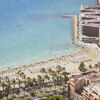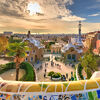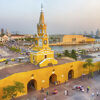28 Nights | Europe
You will visit the following 14 places:

Gibraltar
Gibraltar is a British Overseas Territory on the south coast of Spain known for the Rock of Gibraltar (a major landmark of the region), a 426m limestone ridge at its centre. It is a very unique place for the curious traveller. You can take the time to explore the caves and tunnels. The inside of the rock is an absolute labyrinth with secret internal roads and tunnels four times longer than those on the surface. Military presence and security in this otherwise deserted area is strong but almost invisible. Also, at the Apes' Den (Queen's Gate) and in the area of the Great Siege Tunnels there is the rare opportunity to see semi-wild primates at close quarters. If you let them, the monkeys will be their captivating selves and behave in their everyday natural manner.

Palma
Palma is a resort city, the capital and largest city of the autonomous community of the Balearic Islands in Spain. It is situated on the south coast of Majorca on the Bay of Palma. As of the 2009 census, the population of the city of Palma proper was 401,270, and the population of the entire urban area was 621,000, making it the twelfth largest urban area of Spain. Almost half of the total population of Majorca live in Palma. The Cabrera Archipelago, though widely separated from Palma proper, is administratively considered part of the municipality. Its airport, Son Sant Joan, serves over 22 million passengers each year.

Alicante
Alicante is a port city on Spain’s southeastern Costa Blanca, and the capital of the Alicante province. The area around Alicante has been inhabited for over 7000 years. The first tribes of hunter gatherers moved down gradually from Central Europe between 5000 and 3000 BC. Some of the earliest settlements were made on the slopes of Mount Benacantil. By 1000 BC Greek and Phoenician traders had begun to visit the eastern coast of Spain, establishing small trading ports and introducing the native Iberian tribes to the alphabet, iron and the pottery wheel. By the 3rd century BC, the rival armies of Carthage and Rome began to invade and fight for control of the Iberian Peninsula. The Carthaginian general Hamilcar Barcaestablished the fortified settlement of Akra Leuka (meaning "White Mountain" or "White Point"), where Alicante stands today. The city is popular for its stunning beach views, nightlife, hotel resorts and festivals.

Naples
Naples is a city in Italy; it is the capital of the region of Campania and of the province of Naples. Known for its rich history, art, culture, architecture, music, and gastronomy, Naples has played an important role in the Italian peninsula and beyond for much of its existence, which began more than 2,800 years ago. Situated on the west coast of Italy by the Gulf of Naples, the city is located halfway between two volcanic areas, Mount Vesuvius and the Phlegraean Fields. Naples has the fourth-largest urban economy in Italy, after Milan, Rome and Turin. It is the world's 103rd-richest city by purchasing power, with an estimated 2011 GDP of US$83.6 billion. The port of Naples is one of the most important in Europe, and has the world's second-highest level of passenger flow, after the port of Hong Kong. The city has long been a major cultural centre with a global sphere of influence, particularly during the Renaissance and Enlightenment eras. In the immediate vicinity of Naples are numerous culturally and historically significant sites, including the Palace of Caserta and the Roman ruins ofPompeii and Herculaneum. Culinarily, it is synonymous with pizza, which originated in the city.

Málaga
Málaga is a large city in the southern Spanish region of Andalucia and capital of the Malaga Province. The largest city on the Costa del Sol, Malaga has a typical Mediterranean climate and is also known as the birthplace of famous Spanish artist Pablo Picasso. The city offers beaches, hiking, architectural sites, art museums, excellent shopping and cuisine. While more laid back than Madrid or Barcelona, Malaga is still the center and transport hub for the hugely popular Costa del Sol region, which is flooded with tourists in the summer, and the city has certainly cashed in on the sun and sand, with lots of new construction as well as hotels and facilities geared to tourists. However, Malaga also offers some genuinely interesting historical and cultural attractions in its old city and its setting on the coast is still beautiful.

Funchal
Funchal is the largest city, the municipal seat and the capital of Portugal's Autonomous Region of Madeira. The city has a population of 111,892, making it the 6th largest city in Portugal, and has been the capital of Madeira for more than five centuries. Because of its high cultural and historical value, Funchal is one of Portugal's main tourist attractions. It is also popular as a destination for New Year's Eve, and it is the leading Portuguese port on cruise liner dockings.

Palermo
Palermo is a city of Southern Italy, the capital of both the autonomous region of Sicily and the Metropolitan City of Palermo. The city is noted for its history, culture, architecture and gastronomy, playing an important role throughout much of its existence; it is over 2,700 years old. Founded in 734 BC by the Phoenicians as Ziz ('flower'), Palermo is Sicily's cultural, economic and touristic capital. It is a city rich in history, culture, art, music and food. Numerous tourists are attracted to the city for its good Mediterranean weather, its renowned gastronomy and restaurants, its Romanesque, Gothic and Baroque churches, palaces and buildings, and its nightlife and music. The city is also was one of the largest cities in the Mediterranean and is now among the top tourist destinations in both Italy and Europe. It is the main seat of the UNESCO World Heritage Site of Arab-Norman Palermo and the Cathedral Churches of Cefalù and Monreale. The city is also going through careful redevelopment, preparing to become one of the major cities of the Euro-Mediterranean area. Roman Catholicism is highly important in Palermitano culture. The Patron Saint of Palermo is Santa Rosalia whose Feast Day is celebrated on 15 July. The area attracts significant numbers of tourists each year and is widely known for its colourful fruit, vegetable and fish markets at the heart of Palermo, known as Vucciria, Ballarò and Capo.

Barcelona
Barcelona – Spain's enchanting capital, second largest and most populous city. It is a huge city that vibrates with life, and there’s certainly not another city in the country to touch it for its sheer style, looks or energy. It is one of the world's leading tourist, economic, trade fair and cultural centers, and its influence in commerce, education, entertainment, media, fashion, science, and the arts all contribute to its status as one of the world's major global cities. Barcelona is home to masterpieces of many great architects – the most famous of which is Antoni Gaudí.

Valencia
Valencia is the most populous city of the Autonomous Community of Valencia and the third largest city in Spain, with a population of 809,267 in 2010. It is the 15th-most populous municipality in the European Union. It is integrated into an industrial area on the Costa del Azahar. Its historic centre is one of the largest in Spain, with approximately 169 hectares; this heritage of ancient monuments, views and cultural attractions makes Valencia one of the country's most popular tourist destinations!

Cagliari
Cagliari is an Italian municipality and the capital of the island of Sardinia, an autonomous region of Italy. Cagliari's Sardinian name ''Casteddu'' literally means castle. An ancient city with a long history, Cagliari has seen the rule of several civilisations. Under the buildings of the modern city there is a continuous stratification attesting to human settlement over the course of some five thousand years, from the Neolithic to today. Historical sites include the prehistoric domus de janas, very damaged by cave activity, a large Carthaginian era necropolis, a Roman era amphitheatre, a Byzantine basilica, three Pisan-era towers and a strong system of fortification that made the town the core of Spanish Habsburg imperial power in the western Mediterranean Sea. Its natural resources have always been its sheltered harbour, the often powerfully fortified hill of Monti Castru, the modern Casteddu, the salt from its lagoons, and, from the hinterland, wheat from the Campidano plain and silver and other ores from the Iglesiente mines. Today the city is a regional cultural, educational, political and artistic centre, known for its diverse Art Nouveau architecture and several monuments. It is also Sardinia's economic and industrial hub, having one of the biggest ports in the Mediterranean Sea, an international airport, and the 106th highest income level in Italy (among 8,092 comuni), comparable to that of several northern Italian cities. It is also the seat of the University of Cagliari, founded in 1607, and of the Primate Roman Catholic archdiocese of Sardinia, since the 5th century AD.

Fort Lauderdale
Fort Lauderdale is a city in the U.S. state of Florida, 28 miles (45 km) north of Miami. The city is a popular tourist destination, with an average year-round temperature of 75.5 °F (24.2 °C), and 3,000 hours of sunshine per year. Greater Fort Lauderdale which takes in all of Broward County hosted 12 million visitors in 2012, including 2.8 million international visitors. The district has 561 hotels and motels comprising nearly 35,000 rooms. Greater Fort Lauderdale has over 4,000 restaurants, 63 golf courses, 12 shopping malls, 16 museums, 132 nightclubs, 278 parkland campsites, and 100 marinas housing 45,000 resident yachts. Fort Lauderdale is named after a series of forts built by the United States during the Second Seminole War. The forts took their name from Major William Lauderdale (1782–1838), younger brother of Lieutenant Colonel James Lauderdale. William Lauderdale was the commander of the detachment of soldiers who built the first fort.

Cartagena
Cartagena is Colombia's most famous tourist destination on the Caribbean coast. The city is renowned for its colonial and colourful architecture. With a tropical climate, the city is also a popular beach destination. The city was founded on June 1, 1533, and named after Cartagena, Spain, itself after the original Carthage in Tunisia. However, settlement in this region around Cartagena Bay by various indigenous people dates back to 4000 BC. During the colonial period Cartagena served a key role in administration and expansion of the Spanish empire. It was a center of political and economic activity due to the presence of royalty and wealthy viceroys. In 1984 Cartagena's colonial walled city and fortress were designated a UNESCO World Heritage Site.

Cadiz

Civitavecchia
Civitavecchia is a town and comune of the Metropolitan City of Rome in the central Italian region of Lazio. A sea port on the Tyrrhenian Sea, the name ''Civitavecchia'' means "ancient town". The modern city was built over a pre-existing Etruscan settlement. The massive Forte Michelangelo was first commissioned from Donato Bramante by Pope Julius II, to defend the port of Rome. The upper part of the "maschio" tower, however, was designed by Michelangelo, whose name is generally applied to the fortress. North of the city at Ficoncella are the Terme Taurine baths frequented by Romans and still popular with the Civitavecchiesi. The modern name stems from the common fig plants among the various pools. And also next to the town is the location of the cruise ship docks. All major cruise lines start and end their cruises at this location, and others stop for shore excursion days that allow guests to see Rome and Vatican sights, which are ninety minutes away.









